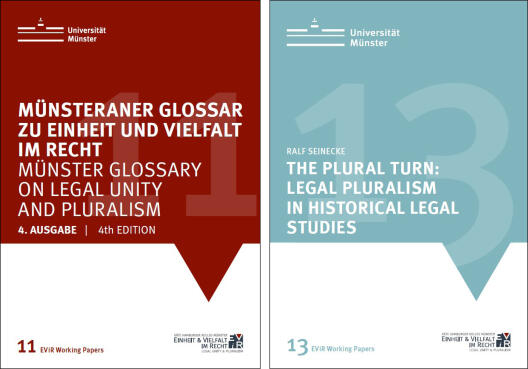Expanded Münster Glossary and paper on legal pluralism published

Two new volumes have been published in the open access series of EViR Working Papers, both of which discuss relevant concepts in the interdisciplinary research field of legal pluralism. The “Münster Glossary on Legal Unity and Pluralism” is now available in its fourth, expanded edition. In addition, a new volume by Ralf Seinecke identifies a ‘plural turn’ in historical legal studies.
The number of lemmas in the Münster Glossary has now grown to 48. In addition to explanations of basic research terms such as Rechtsvielfalt (legal diversity) or Justiznutzung (use of justice), these also include contributions on (legal) historical phenomena such as pardon, petitions or forum shopping. The aim of the glossary, which is successively expanded with each new edition, is to contribute to an interdisciplinary understanding of central terms and concepts from the research field of legal unity and pluralism. As one of the central joint publications of the Käte Hamburger Kolleg, it is largely based on the work of the Kolleg's fellows, academic staff and directors, but also includes contributions from external authors.
The second working paper published is a contribution by Ralf Seinecke entitled ‘The Plural Turn: Legal Pluralism in Historical Legal Studies’. In it, the author diagnoses the emergence of new terms in historical legal research over the last 20 years, such as legal pluralism, legal variety, fragmentation or multinormativity. The essay diagnoses a fundamental change in this field of research towards a ‘plural turn’ that goes hand in hand with these pluralisms.
EViR Working Paper 13: Ralf Seinecke: The Plural Turn: Legal Pluralism in Historical Legal Studies
The EViR Working Papers
The EViR Working Papers are a digital and printed series to publish current research reports, conference papers and joint working papers. It is interdisciplinary and intertemporal in nature and offers a good insight into the diverse research topics of the Kolleg. As an open access publication, it can be accessed via the University’s publication server miami as well as via the website of the Kolleg.

